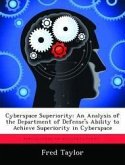Controlling cyberspace as a military domain is a challenge that demands critically assessing issues, questions, and assumptions, especially those at the foundation of the military's decision making for operations and requirements. This thesis examined whether cyberspace can be held in like manner to existing mediums. A brief survey of classical control theories for the land, maritime, and air domains, with the intent of identifying the basic framework and its key areas of emphasis, revealed several common elements in domain control. Strategies by classical theorists, such as Halford Mackinder and Nicholas Spykman for land-centric theories; Alfred Thayer Mahan and Julian Corbett for maritime control theories; and William "Billy" Mitchell and J. C. Slessor for the air domain, relevantly can inform present-day and future cyberspace theorists and war planners. Given the nature of the cyberspace medium and the denominators common to controlling other domains, the US can gain and maintain cyberspace superiority. Cyberspace can be controlled in ways analogous to land, sea, and air domains. Denominators common across the classical control theories for air, land, and sea exist and are applicable to cyberspace's attributes as a dimension of war. Cyberspace control is not a Holy Grail.
Hinweis: Dieser Artikel kann nur an eine deutsche Lieferadresse ausgeliefert werden.
Hinweis: Dieser Artikel kann nur an eine deutsche Lieferadresse ausgeliefert werden.







